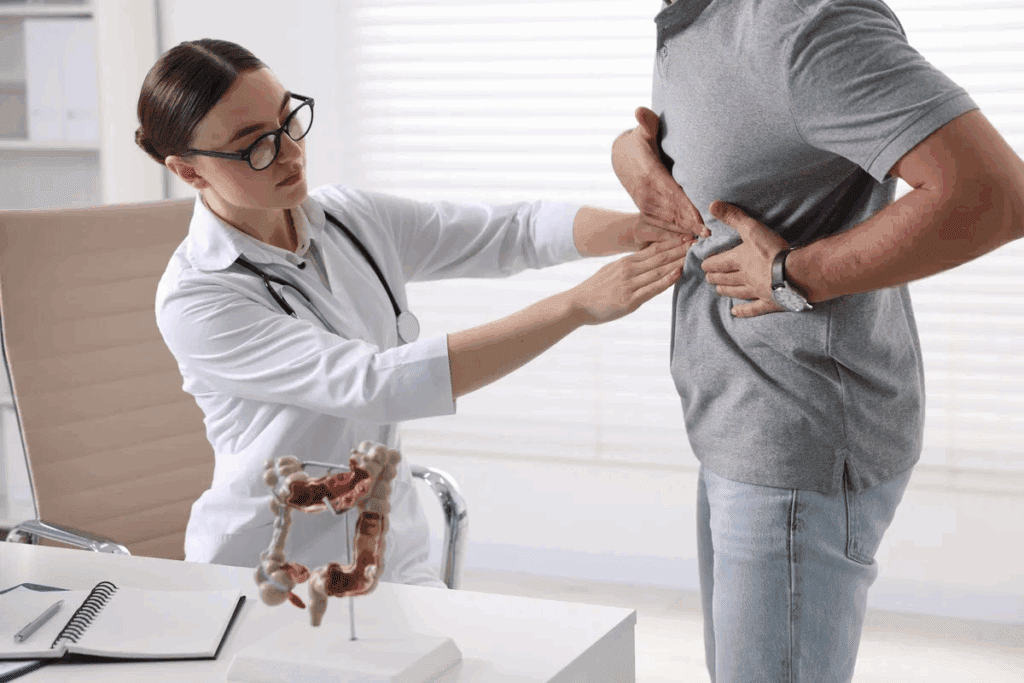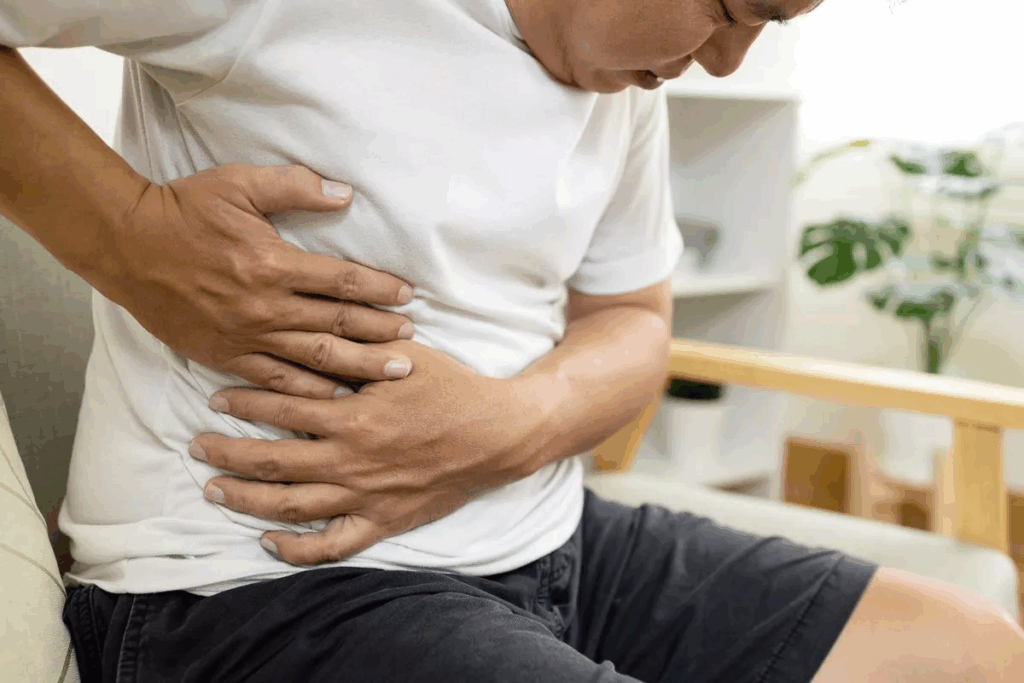Last Updated on November 26, 2025 by Bilal Hasdemir

The gallbladder is a small organ that stores bile. Bile is a fluid made by the liver that helps digest fats. Without it, digestion can be different.
Drinking alcohol after gallbladder removal can cause problems. You might feel bloated, have diarrhea, or acid reflux. This is because the body can’t handle bile as well.
It’s important to know the risks and adjust to your body’s new way of digesting. At Liv Hospital, we help you understand and deal with these changes.

Removing the gallbladder changes how your body digests food. The gallbladder is key in digestion. Its removal, called cholecystectomy, alters body functions.
The gallbladder is a small organ under the liver. It stores bile from the liver. Bile helps digest fats and absorb vitamins.
When you eat, the gallbladder releases bile into the small intestine. This helps with fat digestion.
Bile production is continuous. Without a gallbladder, bile flows directly into the small intestine.
A cholecystectomy is done through small incisions. This surgery often lets patients go home the same day. But, it changes digestion a lot.
Without a gallbladder, bile goes straight to the small intestine. This can cause digestive issues for some, as bile may irritate the intestines.
After surgery, the body adjusts to bile flow changes. The liver keeps making bile, but it goes straight to the small intestine.
| Process | With Gallbladder | Without Gallbladder |
| Bile Storage | Bile is stored in the gallbladder. | Bile flows directly into the small intestine. |
| Bile Release | Bile is released into the small intestine upon eating. | Bile continuously flows into the small intestine. |
| Digestion Impact | Aids in fat digestion during meals. | May cause digestive issues due to continuous flow. |
Doctors say, “Removing the gallbladder changes digestion. It can affect bowel movements and comfort.”
“The liver continues to produce bile, but without a gallbladder, this bile flows directly into the small intestine, potentially affecting digestion.”
Drinking alcohol after gallbladder removal can stress the liver. It’s important to drink in moderation and watch for symptoms.

Knowing the recovery timeline after gallbladder surgery is key. It helps manage expectations and ensures a smooth healing. The recovery is divided into three main phases: right after surgery, a few weeks later, and long-term adjustments.
The first phase is the most important. Patients usually go home the same day or the next day after surgery. It’s vital to follow the doctor’s advice, including what to eat and take medicine.
“The first 48 hours are key,” says Dr. John Smith, a top surgeon. “Rest well and avoid hard work to avoid problems.”
As healing starts, patients can slowly get back to normal. Start with easy exercises and get more intense over time. It’s also important to eat low-fat foods and avoid foods that upset the stomach.
Guidelines say wait at least two weeks before drinking alcohol. This helps the body heal and lowers the risk of issues.
By six weeks, most people have recovered a lot. They can start drinking alcohol again, if their doctor says it’s okay. But, it’s important to listen to your body and adjust as needed.
One patient shared, “It took me about two months to get used to life after my gallbladder surgery. I had to watch my diet and alcohol.”
In summary, following the recovery timeline after gallbladder surgery is essential. By sticking to medical advice and listening to your body, you can get through this journey well.
Without a gallbladder, digestion changes. This can affect how alcohol is absorbed. Bile flows more into the small intestine, impacting alcohol and fat digestion.
After gallbladder removal, the liver keeps making bile. But it goes straight to the small intestine. This can change how fats and alcohol are digested. The liver’s role becomes more critical in breaking down alcohol without a gallbladder.
Drinking alcohol without a gallbladder means it goes into your stomach. Then, it’s absorbed into your bloodstream. The constant flow of bile into the small intestine can change how alcohol is digested. This might lead to different reactions than with a gallbladder.
The liver is key in breaking down alcohol. Without a gallbladder, it has to work harder. This extra work may cause fatigue and other symptoms in some people.
Knowing these changes is important. Drink responsibly, considering your body’s new digestive ways.
Knowing when to start drinking alcohol after gallbladder surgery is key for a good recovery. The body needs time to heal and adjust to life without a gallbladder. Drinking alcohol too soon can slow down this process.
There’s no strict rule against drinking after gallbladder surgery. But, medical guidelines suggest being careful. The main worry is how the body handles fats and alcohol without a gallbladder.
Dr. Sarah Johnson, a gastroenterologist, says, “Give your body time to heal before drinking alcohol again.”
Doctors usually tell patients to wait two weeks before drinking. This two-week waiting period helps the body heal and lowers the risk of problems.
During these two weeks, the body gets used to bile flowing directly to the small intestine. Drinking too early can stress the liver and slow healing.
Several things can make you wait longer before drinking after gallbladder surgery. These include:
One study found, “Patients with liver disease should be more careful and might need to wait longer than two weeks before drinking.”
In summary, while two weeks is the usual wait, your situation might require a longer wait. Always listen to your doctor’s advice for a safe recovery.
Not having a gallbladder changes how alcohol affects the body. After a gallbladder removal, the body’s digestive system works differently. This can make you more sensitive to alcohol and increase the risk of bad effects.
Drinking alcohol without a gallbladder can cause digestive problems. The bile flows into the intestine all the time, not just when you eat. This can irritate your stomach and cause symptoms like diarrhea, bloating, and pain.
Common symptoms include:
Drinking alcohol after gallbladder removal can stress the liver more. The liver works hard to break down alcohol, and without a gallbladder, it has to do even more. Heavy drinking can irritate your stomach and make liver problems worse.
It’s important to know that drinking alcohol without a gallbladder can stress the liver. Drinking in moderation is the best way to avoid problems.
Drinking alcohol too soon after gallbladder surgery can slow down healing. Alcohol can make it harder for your body to recover from surgery. This can lead to complications and make recovery take longer.
How well you can handle alcohol after gallbladder removal varies. Your health, any other medical conditions you have, and how much you drink can all affect the risks. It’s important to think about these factors when deciding to drink.
| Risk Factor | Description |
| Pre-existing liver conditions | Conditions like fatty liver or cirrhosis can increase the risk of liver damage from alcohol. |
| Amount of alcohol consumed | Heavy drinking can make digestive problems and liver strain worse. |
| Overall health | Poor health or other medical conditions can affect how the body processes alcohol. |
Without a gallbladder, your body handles alcohol differently. This can cause various symptoms. Changes in bile production and flow play a big role in how you react to alcohol.
Drinking without a gallbladder often leads to digestive issues. Diarrhea is common because alcohol can upset your stomach and make you go to the bathroom more. You might also feel bloating because your body can’t handle fatty foods or drinks well.
Acid reflux is another problem. Alcohol can make the valve between your stomach and esophagus relax. This lets stomach acid flow back up into your esophagus.
After gallbladder removal, you might be more sensitive to fatty, sugary, or acidic foods and drinks. This sensitivity can get worse when you drink alcohol. It can cause a variety of uncomfortable digestive symptoms.
Drinking without a gallbladder can also cause systemic symptoms. Many people feel fatigued or get headaches after drinking. These symptoms come from your body’s changed way of processing alcohol. It might lead to more toxins in your blood.
While some discomfort is normal, it’s important to know when it’s serious. If you have ongoing or severe digestive problems, like long-lasting diarrhea or sharp stomach pain, see a doctor. Also, if you’re feeling very tired or have bad headaches, get medical help.
It’s key to understand how your body reacts to alcohol after your gallbladder is removed. If you notice unusual or severe symptoms, it’s best to talk to a healthcare professional.
Alcohol’s effect on people without a gallbladder can differ a lot. This is because of personal health and genetics. Some might drink without problems, while others face issues. Knowing what affects your tolerance is key if you want to drink after gallbladder surgery.
Many things can change how you handle alcohol after gallbladder surgery. These include:
To figure out your alcohol sensitivity, start slow if your doctor says it’s okay. Watch how your body reacts, looking for signs like stomach issues, tiredness, or headaches. Keeping a log of your drinking and how you feel can show patterns and what might upset you.
It’s important to listen to your body and adjust your drinking plans. If drinking causes lasting or bad symptoms, you might need to drink less or stop. Talking to your doctor can help you make choices based on your health and history.
By knowing and respecting your limits, you can enjoy drinking after gallbladder surgery. This balance helps you enjoy life while keeping your health in mind.
Drinking alcohol after gallbladder removal needs careful planning. Your body’s digestive system changes without a gallbladder. So, you must adjust how you drink alcohol.
Start with small amounts when you begin drinking again. This slow start helps your body get used to the new digestive system. Start with a low dose to see how your body reacts.
Choosing the right drink is important. Go for low-sugar and low-fat drinks to ease digestion. Dry wines and spirits with low-calorie mixers are better than high-sugar cocktails or creamy liqueurs.
Drinking with meals can lessen alcohol’s impact on your stomach. Food helps buffer alcohol’s effects, making it less likely to cause discomfort. It’s best to drink during or after eating, not on an empty stomach.
Drinking in moderation is essential without a gallbladder. Set a limit and keep to it. Drinking non-alcoholic drinks in between can help pace yourself and stay hydrated.
By following these tips, you can enjoy alcohol safely and support your health after gallbladder surgery.
Drinking alcohol without a gallbladder needs careful planning. Your body can’t digest some foods and alcohol as well. This means you need to think about your diet, even more, when drinking.
Some foods can make digestion worse when drinking. It’s best to stay away from:
Some foods can help with digestion when drinking:
| Food Category | Examples | Benefits |
| Lean Proteins | Chicken, Fish, Tofu | Easier to digest, stabilizes meals |
| Fiber-Rich Foods | Vegetables, Fruits, Whole Grains | Aids digestion, reduces constipation risk |
| Probiotic-Rich Foods | Yogurt, Fermented Foods | Supports gut health |
Drinking enough water is key when drinking alcohol, without a gallbladder. Water helps lessen alcohol’s impact on your stomach. Some supplements can also help with digestion:
Being mindful of what you eat and staying hydrated can help when drinking without a gallbladder. This way, you can enjoy alcohol more comfortably.
After gallbladder surgery, finding a balance is key. It’s important to know how alcohol affects you. This way, you can make smart choices about drinking.
Drinking in moderation is best after gallbladder removal. Watch how your body reacts and adjust your drinking habits. This helps you enjoy life and stay healthy.
Being aware of how alcohol affects you is important. Manage any bad effects to find a good balance. Know your limits, pick the right drinks, and time them well.
Striking a balance between fun and health after surgery takes thought. By being careful, you can avoid risks and live well.
It’s wise to wait at least two weeks before drinking alcohol after surgery. Always check with your doctor for advice that fits your needs.
Without a gallbladder, bile goes straight to the small intestine. This can cause discomfort when drinking alcohol.
Drinking can lead to digestive issues and affect liver function. It can also slow down healing. Your individual health, like liver conditions, matters too.
Recovery times vary, but waiting at least two weeks is common. Some might need more time, depending on their health.
You might feel digestive problems like diarrhea, bloating, and acid reflux. Fatigue and headaches are common too.
Some alcohols are easier to handle than others. Start with small amounts and choose drinks with fewer congeners, like vodka or gin.
Start slow, drink with meals, and drink in moderation. Stay hydrated and consider supplements if needed.
Yes, avoid fatty foods to prevent digestive issues. Eat lean proteins and fiber-rich foods to help with digestion.
If you have health issues like liver disease, talk to your doctor before drinking. They can give advice tailored to your health.
Listen to your body. If you feel uncomfortable or have symptoms, adjust your drinking or talk to your doctor.
Subscribe to our e-newsletter to stay informed about the latest innovations in the world of health and exclusive offers!